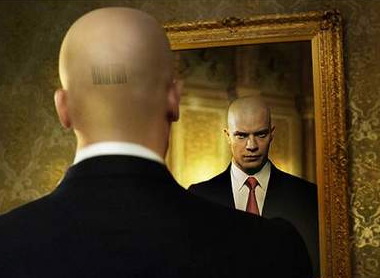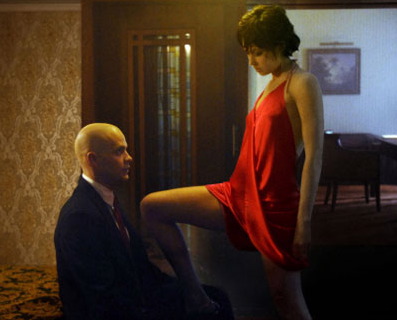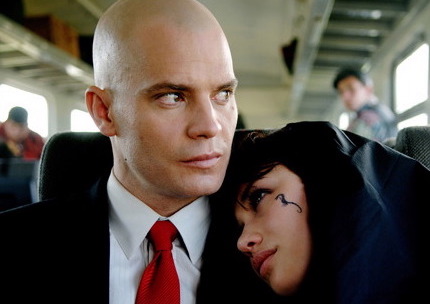So we rented and watched “Sweeney Todd” yesterday. Again. (Believe it or not, renting it wasn’t my idea.) But seeing it again — and in this different way, small screen as opposed to big — gave me a chance to notice other things, take some notes, and, well, share them with you. As if I haven’t talked about it enough. (cough, cough.)
Nevertheless …….
Things I noticed on this in-home examination of “Sweeney Todd”:
~ It’s still hard for me to get used to the instrumental version of “The Ballad of Sweeney Todd.” I mean, the music and lyrics there are inseparable to me. Burton does a sly and visually interesting sequence at the beginning (if a little on the nose), but I still miss the lyrics. Oh, how I miss them! Those lyrics at the top of the show are genius.
~ Johnny Depp. Man. This guy is so good. WHEN is he going to get his Oscar? (Not for Sweeney, Trace. That’s over, mmkay? Please move on.) I did a little experiment while watching this again: I closed my eyes and just listened to his singing and I have to be honest: it doesn’t really hold up. His voice has a bit of a strangled sound at times and he frequently uses that sort of pop star slide up to a note. It’s a bit modern sounding, not to mention kind of a cheat. That being said, when I open my eyes and watch him, I just can’t look away. He’s hypnotic. Depp’s magnetism in the role of Sweeney makes you toss aside any objections about technical imperfections. He is so thoroughly Sweeney, so completely inhabits him, that you just don’t care that his singing isn’t perfect. That’s a great performance.
~ The actor playing Anthony is just so pretty. Prettier than most girls. It’s disconcerting. He’s a prettier Claire Danes than Claire Danes.
~ The song “Pretty Women” with Depp and Rickman is wonderful. They’re great together. It’s such an interesting number. Musically, the actors are doing a duet. Emotionally, they’re lost in their separate little worlds. Sweeney’s swept up in the fulfillment of his revenge. It’s right as his fingertips, literally. The Judge is swept away by lust for Johanna, his fantasies of her. I love that dichotomy. They’re together, but they couldn’t be further apart. As the song reaches its climax and they’re singing — together — “pretty women, pretty women,” and Sweeney’s raising his razor, preparing for the kill, I was covering my eyes. I did this in the theater, too. A kind of “uh-oh, here it comes, here it comes.” Which of course, it doesn’t, and I know that. But that shows just how good Depp is here. I KNOW he doesn’t kill the judge right then, but he is so menacing, so crazed, so convincing, I start to believe the story will suddenly change, that he WILL kill him then and there, and I just have to cover my eyes in the face of it.
~ Right after that, Anthony comes rushing in, interrupting the killing of Judge Turpin. Lovett rushes in then, too, and Sweeney yells at her: “Get out! OUT! OUT!” or something like that. I have to confess I miss the line from the stage version that ends with: OUT I SAY OUUUUUUUUT!!!” I love everything that “ouuuuuuuut!” means. I have no idea why they changed it. Lost a little something there, for me.
~ This viewing, I focused a lot on the kid playing Toby. I think I virtually ignored him in my other review(s) and that’s unfair. No, it’s just wrong. It’s one of my favorite roles in the show. He’s like a little flower struggling to push through the cobblestones and the muck. There has to be some bright spot, some vestige of innocence, and that’s Toby/Tobias. In most stage versions of this — including the one I was in — Toby is traditionally played by a young man, maybe in his early twenties. You know, someone who can stay up past 9:00 and doesn’t bring any parental baggage with him. Just easier in that way. He’s usually played as somewhat mentally disabled, simple-minded. I mean, the guy who played Toby in our show was somewhere between 25 and 30, as I recall, but he was small. (Oh, and so talented. I stood in the wings every night to watch him sing “Not While I’m Around.” Tear-jerker.) Anyhoo. Every Toby I’ve ever seen has been played by an older actor and every Toby has seemed mentally challenged in some way. The part reads like a young boy, so perhaps when you have an older actor playing him, he naturally seems more simple-minded. There becomes an age-behavior discrepancy in the character with an older Toby. Beyond that, the actor has to have some real chops vocally. The role just demands a lot in that capacity and that’s another thing an older actor brings. You’ll likely get someone a bit more experienced.
Watching this yesterday, though, I have to say it’s really refreshing to see a kid in the role. This actor is probably, what, 12? 13? This Toby is a street urchin, a foundling. There’s none of the mentally disabled angle going on here. He’s streetwise. Savvy. He’s been abused and cowed, but he’s able to see things the way they are. Much more than Mrs. Lovett, who has her fantasies about Sweeney, her blindness about Sweeney, Toby sees the truth of what Sweeney has become. He’s frightened of him. And rightly so. He’s frightened for Mrs. Lovett. And rightly so. I love how he’s that boy on the cusp of manhood. How, one moment, I can look at his face and see a little boy and the very next moment, I can see the man he will become. A great face on this kid. And that kind of face in transition works so well in “Not While I’m Around.” Sometimes he seems like a little boy worried about his mother. Sometimes he seems like a man protecting the woman he loves. There’s that shift back and forth. It’s written in the song, the lyrics, but this kid’s face shifts seamlessly and poignantly between those two roles. This actor brings something to it that an older actor just couldn’t: He brings a face that hasn’t arrived yet. A young boy-man a bit confused about which one he really is. He desperately wants to be a man, but he’s limited by a body and size that still suggest a boy. I don’t know where they found this kid, but he’s really great.
~ Oh, and Helena Bonham Carter at the end of “Not While I’m Around.” (I wanted to rewind this, but didn’t. Drat. I should have. Now I have to work from my memory of it.) At one point Toby sings to her:
Not to worry, not to worry
I may not be smart but I ain’t dumb
I can do it, put me to it
Show me something I can overcome
Not to worry, Mum
Being close and being clever
Ain’t like being true
I don’t need to,
I would never hide a thing from you,
Like some…
I love her face as the song goes on. Her dawning realization that Toby understands too much, perhaps more than she ever imagined. She’s been trying to placate him as she would a boy, but it hasn’t been working. He persists. The whole song is Toby’s persistence of vision. Of truth. He sees the truth where no one else does. Or is willing to. Mrs. Lovett does have a kind of maternal affection for Toby, but it’s nothing compared to her obsessive love for Sweeney. Slowly, slowly, over the course of this song, she realizes she’s underestimated Toby. He’s not JUST a boy. He can’t easily be fooled. He wants her to want him to save her. He longs to be her hero, to show her he’s the better man. But his desires threaten Lovett’s foolish fantasies of Sweeney and so, as the song comes to an end, we watch it float across her face: Her choice. Her decision. Toby loves her, maybe in a couple of confusing ways, but Lovett loves Sweeney. While she cares for Toby, she simply can’t be true to him, as he is to her. It’s the worst betrayal in the movie, I think. Her choice ruins Toby. And Bonham Carter’s face as she moves toward that decision. Brilliant. Possibly the best number in the movie.
~ Okay. There’s this thing about Sweeney’s barber chair. I noticed this in the theater and it’s still weird to me. The chair has to be rigged, obviously, for a body to slide out of it and down to the basement where the oven is. Any version I’ve ever seen of Sweeney’s chair has been a chair that flattens, front and down, if that makes sense. The seat and footrest flatten into a natural slide. The actor/body slides feet first into his meat pie future. The falling motion of the body logically follows the way a chair is built. Or follows the natural flow of gravity, is a better way to say it. The movie chair, on the other hand, rises up from the feet and tilts the body backward so it falls head first into the chute, hole, whatever it is. Makes for a gratuitously gruesome head splat, in my opinion. Sweeney slitting the throat of an innocent man just wanting a nice smooth shave is horrific enough, thank you. I don’t need to see his head explode when it hits the basement floor. (I can’t believe I’m going on about the barber chair here, oh well.) Mechanically, the whole thing didn’t make much sense to me and I’d bet money it was done solely for the money shot — that head splat. I can’t imagine any stage version ever doing it this way because the audience would only see the back of the chair as it’s rising up and completely lose the view of the actor sliding into oblivion. From a practical standpoint, too, it makes for a much more complicated chair. I mean, if I’m a maniacal barber on a vengeful killing spree, do I really want a chair that has to do all that just to get the meat from the chair to the oven? Aren’t I asking more of my chair than is necessary? Too much could go wrong. Think of the possible repairs required. Not to mention the fact that the head splat makes for a messier cleanup and — if you think about it from a pie maker’s perspective — means that all those delicious brains are, well, ruined now.
Clearly, I have hit upon a deep and unforgivable flaw in this film. Let’s just move on.
~ There’s this hard swallow Depp takes during “By the Sea” when he’s asked “Do you take this woman to be your lawfully wedded wife?” It kills me. It’s just a passing moment, but I love it. That whole sequence is hysterical to me. At one point, he sits there glumly in his striped Victorian swimsuit with his shoes and socks. HA. He is possessed and miserable and hilarious in this number.
~ Alan Rickman’s codpiece is truly breathtaking.
~ I found myself wanting to draw eyebrows on Johanna. This is totally random.
~ I miss the lush harmonies of “The Letter,” sung by a mixed quintet in the stage version. “Most Honorable Judge Turpiiin …. I venture thus to write you this … urgent … note to warn you ….” In the movie, Sweeney just hands Toby a letter to lure the judge to his “tonsorial parlor.”
~ All right. The ending. On this second viewing, I have to say … it’s a problem. Wow. Is it bleak. Pretty gross, Peaches. That final shot cannot be easily be erased. If you’ve seen it, you know what I’m talking about. Again, it’s that loss of the Greek chorus device that I talked about in earlier reviews. If you’re familiar with it, you feel its absence most keenly at the beginning and the end of the movie. The ending particularly. The chorus — actually, the entire company — coming back onstage, back to life in some cases, delivering the moral with a wink, really serves to disengage the audience from the bloodbath before them. It’s doing you a favor, the way it breaks that fourth wall. It’s offering you a break, a breather. It’s okay. This is a play, a story. When it’s not there, you’re basically left bereft and sick. As I’ve said before, there’s nothing to mitigate all the damages. Harsh, man. It’s pretty harsh.
~ My Beloved made an interesting point when it was over. We were talking about whether we’d want to buy the DVD, have it as part of our personal viewing library, and I said no, actually. Much as I think it’s a really good — almost great — movie version of the play, I don’t need to own it. I have huge respect for the direction, for many of the performances, and I love the music, but I don’t think I’d repeatedly view it, which is why we have most of the movies we have in our library. What you’re left with in the end is so very bleak and gruesome. It’s hard to take. Hard to shake. MB said, “Yeah. It’s like you wouldn’t really want it in your personal space. In your face like that.” I think there’s really something to that. A TV is a much smaller screen, of course, but it’s your personal screen in your personal space and there’s no escaping that. When you see something so unrelenting and dark on your own TV, it feels like it seeps into the walls and hangs from the curtains of your home. I’m content to be a fan of this from a distance. I’ll always listen to the original Broadway soundtrack. That’s in my blood. That’s part of me. With the movie, I’m happy to applaud loudly, say, “Oh, well done!” and try to go on my merry way once the credits roll.




